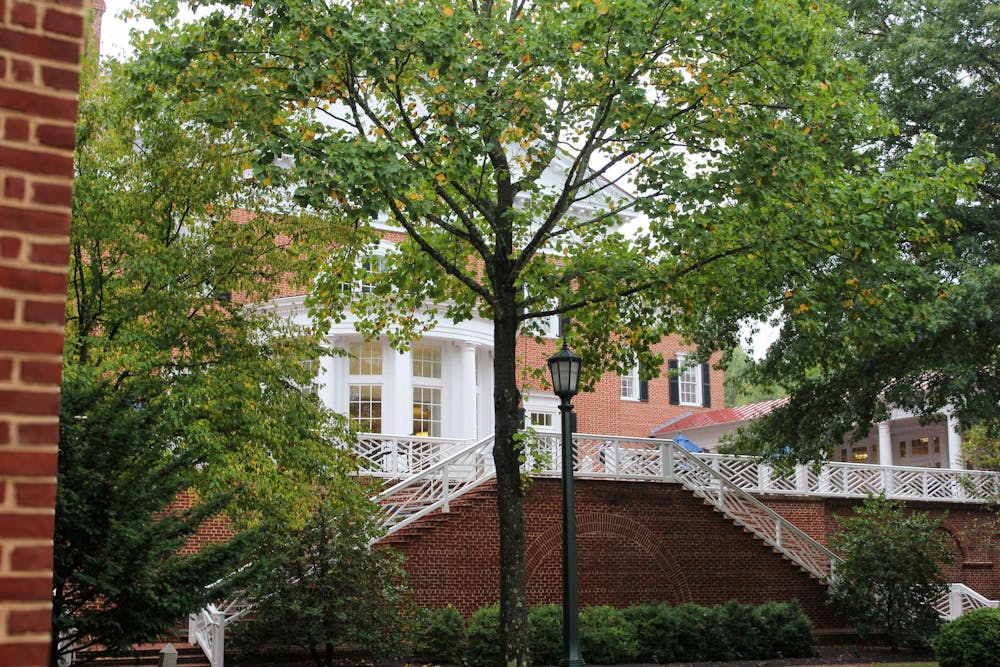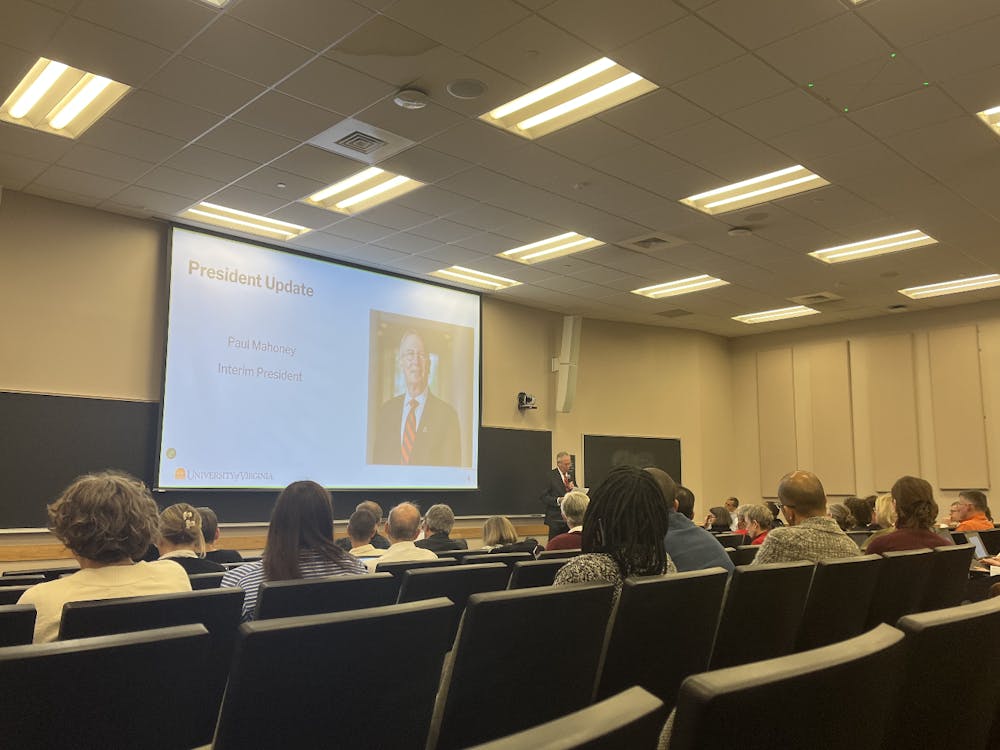The Pan-University Entrepreneurship Initiative, a program that aims to to develop the entrepreneurial skills of students and faculty, is set to ramp up its programs in the coming week, with a student-oriented entrepreneurial clubhouse set to open its doors Oct. 2 and an Entrepreneurship Week Sept. 28 through Oct. 4 which will hold events including entrepreneurship challenges and an escape room for students. While some professors and students say the initiative will help foster more student innovation at the University, other members of the University community — including a member of the Board of Visitors — remain skeptical about whether investing in entrepreneurship should be a priority at the University.
Established in October 2023, the Pan-University Entrepreneurship Initiative aims to foster a culture of innovation and entrepreneurship to encourage and inspire young entrepreneurs. According to Michael Lenox, Business Administration prof. and the initiative’s chair, it will provide resources such as programming, funding, mentorship and a “clubhouse for creative types.” The program is led by Lenox and coordinated by University President Jim Ryan and Ian Baucom, executive vice president and provost.
As part of the initiative, the University will celebrate the launch of the Foundry building Oct.2. Located at 9 Elliewood Ave, it will serve as a student center for entrepreneurship and mentorship. Previously, the location was occupied by Forge — a nonprofit organization that helps students find internships and otherwise advance their careers.
In an interview with The Cavalier Daily, Lenox said that the building will offer a central location for students to discuss entrepreneurial endeavors and receive mentorship while also providing an extracurricular meeting space for different student organizations around Grounds, such as the Darden Business Innovation & Design Club and the Entrepreneurship and Venture Capital Group — both student-led clubs at the Darden School of Business that engage with entrepreneurship and business practices.
“We have a number of different student organizations in this space and around Grounds. We're hoping that the Foundry becomes their home base — the place they feel comfortable having their meetings, doing events and the like,” Lenox said. “It's really about catalyzing and amplifying things that have already been taking place, and providing just another level of service for our students.
Lenox said that the Pan-University Entrepreneurship Initiative is partnering with some student groups to plan a number of events during its Entrepreneurship Week. Events will include a founders fair at Newcomb Hall Oct. 1 and an entrepreneurship challenge at the Foundry. The Alumni Association will also hold an Entrepreneurship Mini-Summit Oct. 4 to facilitate conversations between alumni about creating startups and growing businesses in a sustainable way. After the week itself, Lenox said that McIntire School of Commerce will host an entrepreneurship escape room Oct. 28.
According to Lenox, the University is also working to create a wet lab accelerator — a cloud-based tool designed for conducting biological experiments using robotic controls. Lenox said this accelerator will offer technological tools for students interested in pursuing ventures in biotechnology and life sciences. For this project, the University is partnering with the Charlottesville Biohub, a biotechnology industry cluster with over 75 Charlottesville companies.
To aid students and faculty in the patenting and licensing process, the Pan-University Entrepreneurship Initiative will also be partnering with the U.Va. Licensing and Ventures Group. This group works with students, staff, researchers and investors to manage patents, negotiate licensing agreements and bring businesses and innovations into the marketplace.
Lenox spoke about the initiative and its goals at the June 6 Board of Visitors meeting, but some members of the Board were skeptical of its efficacy for the price tag. In an interview with The Cavalier Daily, Board Member James Murray said that the skills necessary to succeed as an entrepreneur are innate traits that can not be taught, and that the University should instead invest in other important qualities through the liberal arts.
“I think it would be fiscally prudent for us to constantly question whether this is the best way to spend money, because … most of [the best entrepreneurs] are college dropouts,” Murray said. “What's much more important that they can learn in college are the liberal arts, the basic skills of dealing with fellow human beings, the way to debate, the way to do research.”
Murray, both at the Board meeting and in his interview with The Cavalier Daily, compared entrepreneurship to the art of music, stating that music requires natural and untaught skills and the University is just as likely to produce good musicians as they are to produce successful entrepreneurs.
At the June Board meeting, Craig Kent, chief executive officer of U.Va. Health and executive vice president for health affairs, said he agreed with Murray’s claims that there is an untaught talent that being a successful entrepreneur requires, saying that the University needs to instead recruit students with existing entrepreneurial mindsets in order to create an ecosystem of innovation across Grounds.
In contradiction to Murray and Kent’s claims, both Lenox and Business Administration Prof. Saras Sarasvathy said that the tenets of entrepreneurship are teachable, and that investing in resources for students with passions or interests in entrepreneurship should be a priority of the University.
While Murray compared entrepreneurship to music, Sarasvathy compared it to historical perceptions of science, saying that in the eighteenth century, many argued that science could not and should not be taught to all as they said that only some people had certain innate abilities to engage with the natural world. According to Sarasvathy, while not everyone who engages with entrepreneurship will succeed, it is still a valuable field due to the other skills it can teach students.
“The aim of teaching science is not to create Einsteins … it is to build a society capable of reason, and then people will choose to do all kinds of things with that reason,” Sarasvathy said. “Some of us then will become scientists, and some of us will make really important contributions to science, [only] a very few of us will win the Nobel Prize.”
According to Lenox, the objective of the entrepreneurship initiative should be to encourage entrepreneurial thinking and expose students to the possibility that they can create something new and be successful.
“I think what the academic research shows us is that entrepreneurs are very much made, not born, and that anyone can be an entrepreneur. It is a set of skills that can be learned and in some ways be inspired,” Lenox said. “What I love is this idea that entrepreneurial thinking is about giving students agency, agency to envision paths to create value and solve problems through the art and the act of creation.”
Sarasvathy said she has evidence to support the claim that entrepreneurship can be developed in students. After conducting a study of 45 individuals who she deemed “expert entrepreneurs,” all of whom had at least 15 years of experience in creating businesses, Sarasvathy developed the idea of effectuation in entrepreneurship — which she defined as a model of decision making used to manage uncertainty when starting a business.
In 2023, Sarasvathy, along with Business Administration Prof. Sankaran Venkataraman and Public Policy Prof. Chrisine Mahoney wrote a letter to the University explaining the findings of this study and encouraging the University to teach risk management for entrepreneurs through the study of effectuation.
“We need a whole new toolbox — an effectual, in addition to a causal toolbox — to build enduring organizations. Interestingly, learning toolboxes and developing the judgment to know when to use them is increasingly important for entrepreneurs, managers, policymakers, and others,” the letter reads. “We need to view entrepreneurship as a method … [and] develop entrepreneurship education like science education.”
While questions remain as to if the investment will yield significant results, some students have already expressed their support for the initiative. Second-year College student Tina Yao stated that she grew up wanting to create new things and start independent ventures but lacked the resources to turn her ideas into action. Yao said she thinks that it is important for the University to invest in entrepreneurship programs to allow students to embrace their creativity and pursue their passions while minimizing the barriers of funding and networking.
“I think everyone has an entrepreneurial drive,” Yao said. “[We all] want to do something and create, and there are a lot of companies that want students with entrepreneurial drive. So I think it's really important to have [these] programs.”
The official launch of the Foundry October 2 will be accompanied by a week of interactive activities from various University departments, including U.Va. Innovates and the Alumni Association, from Sept. 28 through Oct. 4.







